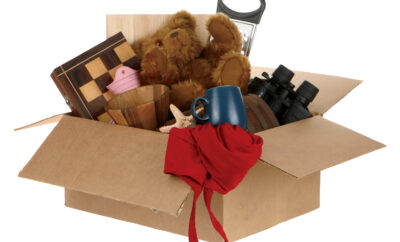Bygone Chore Is Ironed Into Music and Memories

Photo credit: iStock/RyanJLane
I remember my mother standing at the ironing board, ironing our family’s clothes: my father’s work pants, my brother’s shirts, my dresses, her blouses and all the other garments we wore. Before she began ironing, she set up the extendable metal ironing board in our dining room, near the eating table and next to our woodstove. On winter days, when the wood fire was crackling and radiating heat, this was a cozy spot. While my mother ironed, concentrating on smoothing the clothes’ wrinkles, I sat at the table and watched her. She had placed our portable record player on the table, so she could listen to music while she ironed. My favorite song then was “Moon River,” sung by Jerry Butler, and I played the record over and over. This song and the rhythmic thump of my mother’s iron on the board were soothing sounds.
In those days in the 1960s, we didn’t have a clothes dryer. My father had built a sturdy clothesline in the backyard, where we hung our clothes to dry. On sunny summer days, the clothes would dry quickly, but on cold winter days, the clothes took longer to dry and occasionally froze on the lines. On rainy or snowy days, my mother hung our clothes upstairs on a folding drying rack. Regardless of how they dried, the clothes would be noticeably crinkled and need my mother’s careful ironing to make them presentable to wear.
I think my mother enjoyed ironing. She never complained about the task, no more than she complained about cooking or housecleaning. But for a period in the 1970s, she hired our elderly neighbor Cora to do our ironing. Cora, who became a widow in 1971, seemed to appreciate spending a couple of hours a week at our house, chatting with my mother and ironing our clothes. Honestly, I think my mother hired her to give her something to do.
See more: Barefoot in the Snow: First Snow of Winter
Cora entered our front door with a cackling laugh, her good nature always apparent. Earlier in my childhood, she had babysat with me during the summer while my parents worked. Her husband Neal, a carpenter and a devout Baptist, would sit with me in the front porch swing and talk. One day he made me a slingshot from the fork of a tree limb and showed me how to aim it. I liked sitting and eating at the small kitchen table with Cora and Neal, who treated me more like a grandchild than a neighborhood kid.
My mother often told me a story about when we first moved into our house in 1957. I was a baby then, and it was cold weather.
“We didn’t have any heat in the house,” she recalled, “so Cora invited me to bring you up to her house to keep you warm. I took you up there and held you by the stove. It seems like as soon as we moved in, the neighbors helped us.”
This was the kind of close-knit neighborhood we lived in, where neighbors treated each other like family.
While Cora ironed, she, like my mother, enjoyed listening to music. Around Christmastime, we played my mother’s holiday albums. One day we were listening to Glen Campbell’s “That Christmas Feeling.” When the song “Pretty Paper” played, Cora listened intently, and when it was over, she said, “That was a sad song.” She seemed melancholy, and I imagined the song stirred a feeling of loneliness in her and reminded her of how she missed Neal.
But otherwise, Cora was happy while she ironed. I’m sure the salary my mother paid her wasn’t even a factor in her wanting to iron for us. It was our company she valued, feeling like she was a part of our family, which in a way she was.
Sometimes as Cora was ironing the last pieces – my father’s white handkerchiefs and other smaller items – my mother stood in the adjoining kitchen and baked a pan of biscuits. When the biscuits were done, Cora sat at the table, opened a couple of them, and added butter and homemade strawberry preserves. She ate the warm biscuits slowly, savoring every bite. On summer days, Cora always ended her ironing with a bowl of ice cream. I think my parents kept a carton of ice cream in our freezer as much for Cora as for the rest of us.
See more: Nostalgic Smells Provide Solace in Trying Times
In the mid-1980s, I bought my mother a Maytag electric dryer, and most of her ironing stopped. With permanent press clothes and the heat of the dryer, wrinkles weren’t a problem anymore. Cora was in her 80s then and had retired from her ironing job. As my mother grew older, I did her occasional ironing for her, setting up the old ironing board in her dining room. The woodstove was now gone, and a cupboard stood in its place.
Before my mother passed away, she said, “I want you to have an iron I’ve kept.”
The Sears Kenmore dry iron, one from the 1950s and likely the iron she’d used in my early childhood, was stored in a cabinet on her back porch. I took the iron home, cleaned its black handle and stainless steel body and soleplate, and displayed it in my laundry room, where it remains today.
When I hear “Moon River,” I think of those days long ago when my mother stood at the ironing board in our dining room, absorbed in her work. And at Christmastime if I hear “Pretty Paper,” I think of Cora, whose happy mood faded for a moment while she listened to the sad song.
About the Author: Julia Nunnally Duncan’s publications include 10 books of prose and poetry, including an essay collection called A Place That Was Home. Her nostalgic stories often recount her 1960s upbringing in a small Southern town and frequently appear in such magazines as Smoky Mountain Living, Blue Ridge Country, Good Old Days and many others. A retired community college English instructor, Julia now enjoys writing and spending time with her husband, Steve, and their daughter, Annie.















Leave a Comment